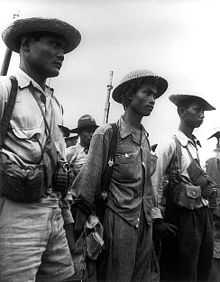Juan Pajota
| Juan Pajota | |
|---|---|
|
Captain Juan Pajota | |
| Born |
c.1914 Nueva Ecija, Philippines |
| Died |
1976 United States |
| Allegiance |
|
| Years of service | 1941-1946 |
| Rank |
|
| Battles/wars |
World War II •Raid at Cabanatuan |
| Awards | Bronze Star |
Captain Juan Pajota (c.1914 – 1976) was involved in the Raid at Cabanatuan, an action which took place in the Philippines on 30 January 1945 by US Army Rangers and Filipino guerrillas and resulted in the liberation of more than 500 American prisoners of war (POWs) from a Japanese POW camp near Cabanatuan.[1]
World War II

A local from Nueva Ecija, he joined the USAFFE soldiers during the retreat from Bataan. Later he became leader of the guerillas,[2] and joined up with Robert Lapham.[3]:39
Raid at Cabanatuan
Under the command of Captain (later promoted Major) Juan Pajota, who coordinated support, this force was responsible for the roadblock at the Cabu River bridge which totally destroyed the Japanese 359th Independent Infantry Battalion. Without the guerrillas' support it is unlikely that the raid would have been as successful, or even succeeded at all.[4] Pajota and the Filipino guerrillas received Bronze Stars for their role in the raid.[5]
Military tactics
Pajota's intimate knowledge of the enemy's activity, the local people and the terrain proved to be crucial to the rescue. He instructed the local villagers to muzzle their dogs to prevent them from barking when the American troops would pass through; an action which was timely and prudent. His recommendation to Lt. Col.Henry A. Mucci that the mission (Raid at Cabanatuan) be moved back 24 hours due to heavy Japanese activity also proved to be a wise move.[6] Capt. Pajota also suggested a flyover of an American plane to divert the attention of the Japanese while the Allied troops were moving.[7] His troops held back the advancing Japanese tanks and reinforcements and prevented them from crossing the Cabu Bridge to attack the rescuers and POWs. He had procured about 50 carabao (water buffalo) carts for a caravan which was used to transport the liberated prisoners to friendly lines, saving the lives of many prisoners.[2]
Return the military stint and joined the Commonwealth Army
After the Raid on Cabanatuan on January 31, Captain Pajota, formerly with the Squadron 213 guerrillas, joined the group of soldiers and military officers under the Philippine Commonwealth Army and became Army Captain on February 1945. He went to the general headquarters in Nueva Ecija and assisted in the battles to liberate Central Luzon and helped guerrilla resistance and Allies in attacking and defeating Japanese troops.
Post World War II
After World War II, Pajota moved to the United States, where he died in 1976 of a heart attack, before becoming a United States citizen.[1]
Popular culture
Captain Juan Pajota appeared as a character for the 2005 John Dahl film, The Great Raid. He was played by Filipino actor Cesar Montano.[8]
References
- ↑ 1.0 1.1 "People & Events: Juan Pajota and Filipino Contributions to the Raid". American Experience. WGBH. 1999. Retrieved 11 June 2013.
- ↑ 2.0 2.1 Oxford, Gordon L. THE CABANATUAN PRISON RAID: THE PHILIPPINES 1945 (PDF). Osprey Publishing. p. 64.
- ↑ Lapham, R., and Norling, B., 1996, Lapham's Raiders, Lexington: The University Press of Kentucky, ISBN 0813119499
- ↑ King, Michael J. (1985). Rangers: Selected Combat Operations in World War II. Combat Studies Institute. ISBN 9781428915763.
- ↑ Hunt, Ray C.; Norling, Bernard (2000). Behind Japanese Lines: An American Guerrilla in the Philippines. University of Kentucky Press. p. 199. ISBN 9780813127552. Retrieved 11 June 2013.
- ↑ Mobilereference, Mobile Reference (Jan 1, 2007). Encyclopedia of World War II (WWII) Battles (Mobi History). ISBN 9781605011554.
- ↑ Barchers, Suzanne I. (2010). War Stories for Readers Theatre: World War II. Libraries Unlimited. ISBN 978-1-59158-750-7.
- ↑ MORROW, PAUL (16 June 2006). "AN INTERVIEW WITH GREAT RAID DIRECTOR, JOHN DAHL". Pilipino Express.